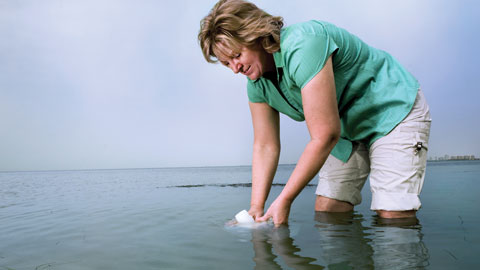 |
 |
Beach Water Bacteria Finding Receives Widespread Coverage
Researcher zeroes in on staph exposure
The enthusiasm that Lisa Plano, M.D., Ph.D., has for staph bacteria is, well, infectious. The associate professor of pediatrics and microbiology and immunology describes the microorganisms as “the coolest thing in
the world,” her face lighting up as she describes their ability to adapt and thrive among humans. “They seem to have a purpose. It’s just fascinating.”
 |
The research of Lisa Plano, M.D., Ph.D., focuses on swimmers’ exposure to staph bacteria in the waters
at public South Florida beaches. |
Plano’s fascination with science started
as a teenager and took her to the University of Alabama, where she dreamed of becoming a marine biologist and turned into a rabid college football fan. Her latest research project took her back to the sea, and the results brought international attention.
Plano, who also has an appointment in dermatology, collaborated
with other scientists from the Miller School, the Rosenstiel School of Marine and Atmospheric Science, and Nova Southeastern University to take a
closer look at staph bacteria. They found that swimmers using public South Florida beaches increase their risk for exposure to staph organisms. Plano says swimmers in subtropical marine waters have a “significant chance, approximately 37 percent,
of being exposed to staph—either
yours or possibly that from someone else in the water near you.”
She presented those findings earlier this year at the American Association for the Advancement of Science annual meeting in Chicago. As word of the study spread, the Alabama-born scientist fielded interviews from as far away as Singapore and Australia, and was later invited to speak on a panel
for Oceans and Human Health.
In Plano’s study, Methycillin-resistant Staphylococcus aureus, commonly known as MRSA, was found in less than 3 percent of staph bacteria from the beach waters sampled. “Go ahead on in,” she advises, adding that one should shower before swimming to protect others and afterward to protect oneself.
Plano is working on a grant to extend the research by another five years and head back to the beach.
Staph bacteria can gain entry through the skin, and children are especially vulnerable to it. The next goal will be to examine whether certain human behaviors, especially among kids, contribute to its spread.
|
 |
 |


